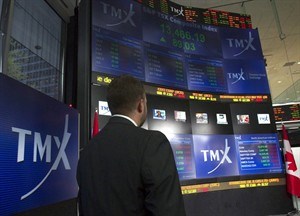
The TMX Broadcast Centre's monitors are shown in Toronto on May 16, 2011. THE CANADIAN PRESS/Frank Gunn
July 24, 2012 - 8:49 AM
TORONTO - The Toronto stock market looked set for a flat open Tuesday with traders cautious because of the worsening European debt crisis and mixed earnings reports.
The Canadian dollar was down 0.21 of a cent to 98.14 cents US amid further losses in oil and metals.
U.S. futures were lower with the Dow Jones industrial futures down 21 points to 12,624, the Nasdaq futures were off 5.2 points to 2,574 and the S&P 500 futures lost 4.2 points to 1,339.5.
Stocks finished well in the red on Monday because of worries that Spain may need a full-blown sovereign bailout. The country has been mired in recession and its banks are saddled with billions of euros in toxic loans arising from a collapsed real estate market.
Confidence about Spain's ability to deal with its finances has taken a beating, with the country forced to pay ever higher yields in order to finance its debt. The yield on its benchmark 10-year bond surged well past the seven per cent mark Monday, a level considered unsustainable.
The yield on the country’s 10-year bonds was up another 0.11 percentage points at 7.54 per cent, while the IBEX 35 stock index in Madrid was two per cent lower. On Monday the yield rose to 7.56 per cent.
Spain also paid more to finance its short-term debt.
Spain's Treasury sold €1.63 billion in three-month bills at an average interest rate of 2.43 per cent compared to 2.36 per cent in the last such auction June 26.
Adding to market pessimism was a move by Moody's Investor Services late Monday to lower the outlook on Germany's AAA rating to negative from stable due to mounting uncertainties from the euro-zone debt crisis.
Moody's also downgraded the outlooks on the Netherlands and Luxembourg and affirmed Finland's AAA rating.
The agency noted that the cost of supporting Italy and Spain in the eurozone would fall most heavily on better rated members "if the euro area is to be preserved in its current form."
Commodities were lower again Tuesday after demand worries and a rising American currency impacted prices for oil and metals.
The September crude contract on the New York Mercantile Exchange declined 24 cents to US$87.90 after plunging almost $4.
Copper lost two cents to US$3.36 a pound on top of Tuesday's seven-cent drop while August bullion lost $3.40 to US$1,574 an ounce.
Commodities fell despite some positive news about the Chinese economy.
Preliminary results of HSBC’s monthly survey of Chinese manufacturers showed the contraction in manufacturing eased in July. The bank’s Purchasing Managers' Index which combines various measures of manufacturing activity rose to 49.5 from 48.2.
European bourses were listless with London's FTSE 100 index off 0.07 per cent, Frankfurt's DAX was off 0.18 per cent while the Paris CAC 40 added 0.01 per cent.
On the earnings front, Rogers Communications Inc.'s (TSX:RCI.B) net income declined 2.4 per cent to $400 million, or 75 cents per share. Adjusted earnings of $478 million, or 91 cents per share beat estimates by five cents.
Revenue was $3.11 billion, up slightly from $3.1 billion in the comparable period, but below expectations of $3.14 billion.
Husky Energy Inc. (TSX:HSE) says weaker commodity prices helped pull second-quarter net earnings down to $431 million, or 43 cents per share, from $591 million, or 60 cents per share, a year ago.
In the U.S., the DuPont Co. said quarterly net income totalled $1.18 billion, or $1.25 per share, down from $1.22 billion, or $1.29 per share, for the same period last year. Excluding one-time items, net income was $1.48 per share, missing estimates by two cents. Revenue of $11 billion also fell short of forecasts. Volumes were off in several business units and the company saw continued weakness in the market for titanium dioxide, particularly in Europe and Asia.
United Parcel Services is lowering its earnings expectations as economic weakness and uncertainty persist around the globe. UPS now expects to earn between $4.50 and $4.70 per share, up three to eight per cent over last year’s adjusted results. The company’s previous forecast was for earnings of $4.75 to $5 per share.
United Parcel Service Inc. says its customers are worried about the global economy weakening in the second half of the year.
In the spring quarter, net income rose two per cent to $1.12 billion, or $1.15 per share.
Earlier in Asia, Japan’s Nikkei 225 stock average closed down 0.2 per cent, South Korea’s Kospi added 0.3 per cent and Hong Kong’s Hang Seng fell 0.8 per cent.
News from © The Canadian Press, 2012